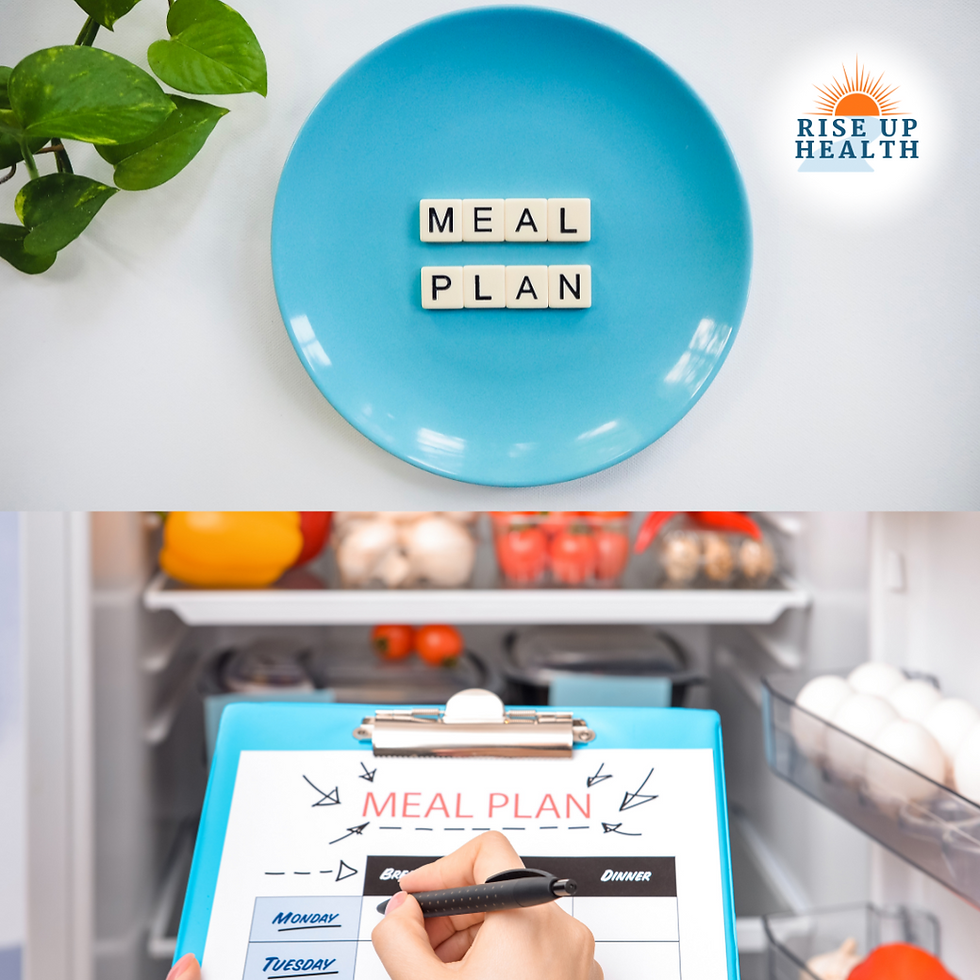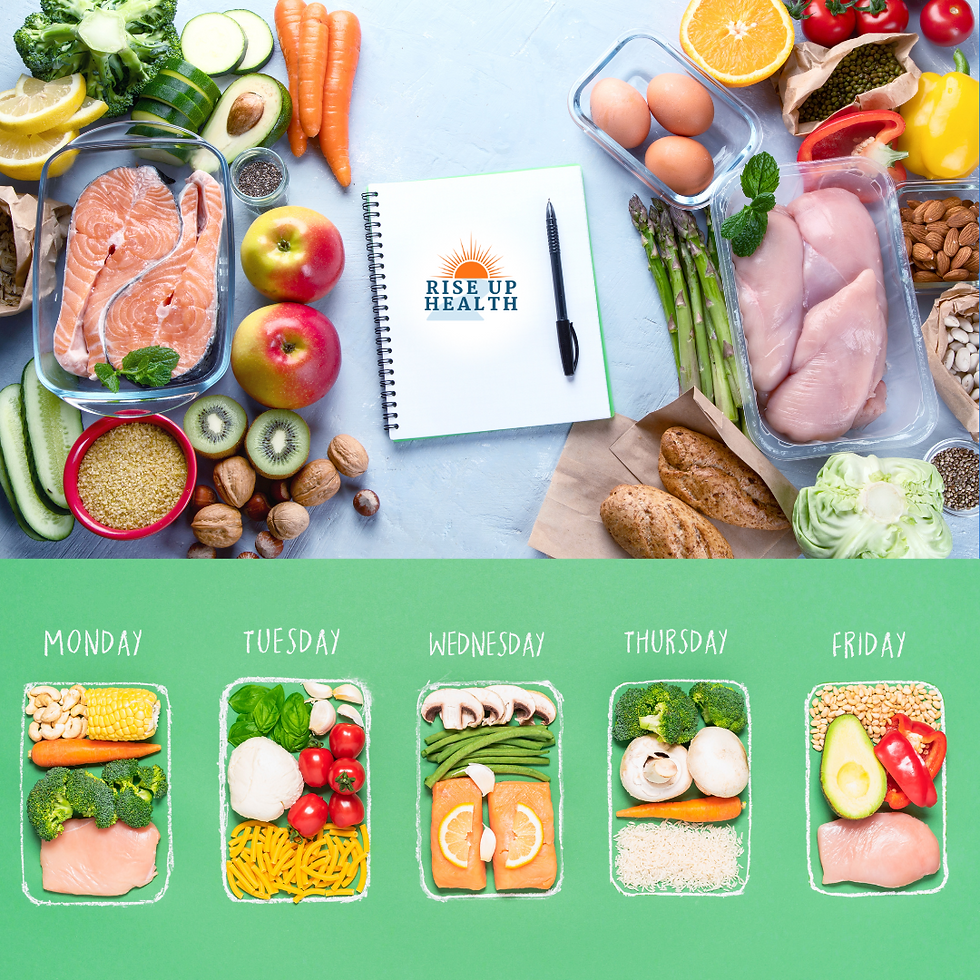
Meal planning is an excellent habit that can help you save time, money, and make healthier choices when it comes to eating. When you plan your meals in advance, you have more control over your diet and can avoid the temptation of unhealthy fast food and snacks.
Side Note: Did you know that you can use the ever improving chat bots / AI / Artificial Intelligence that are popping up in your Snapchat app, or free websites, to help you plan out your day or week? Yep!
Here is a site we like > https://openai.com/blog/chatgpt , but the Snapchat AI is pretty good too!
You can supply these chat bots with all types of meal planning info, such as what's in your kitchen right now, what your calorie or macro goals are, what your preferences are...the list is endless!
If you're looking to start routinely meal planning, here are some tips to help you get started:
Set a Goal: Before you begin meal planning, it's essential to have a clear goal in mind. For example, you may want to start eating healthier, lose weight, or save money on groceries. Once you have a goal in mind, it's easier to plan your meals accordingly.
Find Recipes: Look for recipes that are easy to make and that you enjoy eating. You can find inspiration for recipes online, in cookbooks, or by asking friends and family for their favorite recipes. Make sure to choose recipes that fit your dietary needs and preferences.
Make a List: After you've found recipes, make a list of the ingredients you'll need. Make sure to check your pantry and fridge before you head to the grocery store to avoid buying duplicates of items you already have.
Plan Ahead: Set aside time each week to plan your meals for the upcoming week. Decide which meals you'll eat each day and make a grocery list based on the ingredients you'll need. You can also prep some of the ingredients ahead of time, like chopping vegetables or marinating meat.
Shop Smart: When you're grocery shopping, stick to your list and avoid impulse purchases. You can also save money by buying in bulk or choosing generic brands instead of name brands.
Cook in Batches: To save time, consider cooking in batches. You can make a large pot of soup or chili and eat it for several meals throughout the week. You can also freeze leftovers for later use.
Stay Flexible: Remember that meal planning is not set in stone. If you have a change of plans, you can always swap out one meal for another. Don't be too hard on yourself if you slip up or forget to plan a meal. Just get back on track as soon as you can.
In conclusion, routinely meal planning can help you save time, money, and make healthier choices when it comes to eating. With a little planning and preparation, you can set yourself up for success and achieve your health and wellness goals.
Need an example meal plan?

Here's a sample weekly meal plan that includes a daily macro goal of 120 grams of protein, maximum of 50 grams of fat, and does not exceed 1600 calories. This meal plan is designed to be budget-friendly by repeating some items:
Monday:
Breakfast: Greek yogurt with mixed berries and granola (300 calories, 22g protein, 3g fat, 42g carbohydrates)
Snack: Hard-boiled egg with baby carrots (100 calories, 8g protein, 6g fat, 2g carbohydrates)
Lunch: Grilled chicken breast with quinoa and mixed vegetables (400 calories, 38g protein, 10g fat, 38g carbohydrates)
Snack: Protein shake (1 scoop whey protein, 1 cup unsweetened almond milk, and 1 banana) (250 calories, 28g protein, 3g fat, 27g carbohydrates)
Dinner: Baked salmon with roasted sweet potatoes and broccoli (550 calories, 24g protein, 15g fat, 43g carbohydrates)
Tuesday:
Breakfast: Oatmeal with sliced banana and cinnamon (300 calories, 8g protein, 5g fat, 54g carbohydrates)
Snack: Cottage cheese with pineapple chunks (100 calories, 14g protein, 1g fat, 6g carbohydrates)
Lunch: Grilled chicken breast with mixed greens, cherry tomatoes, and balsamic vinaigrette (300 calories, 36g protein, 6g fat, 14g carbohydrates)
Snack: String cheese with apple slices (100 calories, 5g protein, 4g fat, 10g carbohydrates)
Dinner: Ground turkey stir-fry with mixed vegetables and brown rice (550 calories, 29g protein, 14g fat, 45g carbohydrates)
Wednesday:
Breakfast: Greek yogurt with mixed berries and granola (300 calories, 22g protein, 3g fat, 42g carbohydrates)
Snack: Hard-boiled egg with baby carrots (100 calories, 8g protein, 6g fat, 2g carbohydrates)
Lunch: Grilled chicken breast with quinoa and mixed vegetables (400 calories, 38g protein, 10g fat, 38g carbohydrates)
Snack: Protein shake (1 scoop whey protein, 1 cup unsweetened almond milk, and 1 banana) (250 calories, 28g protein, 3g fat, 27g carbohydrates)
Dinner: Baked salmon with roasted sweet potatoes and broccoli (550 calories, 24g protein, 15g fat, 43g carbohydrates)
Thursday:
Breakfast: Omelette with spinach, feta cheese, and whole grain toast (300 calories, 23g protein, 10g fat, 20g carbohydrates)
Snack: Cottage cheese with pineapple chunks (100 calories, 14g protein, 1g fat, 6g carbohydrates)
Lunch: Grilled chicken breast with mixed greens, cherry tomatoes, and balsamic vinaigrette (300 calories, 36g protein, 6g fat, 14g carbohydrates)
Snack: String cheese with apple slices (100 calories, 5g protein, 4g fat, 10g carbohydrates)
Dinner: Ground turkey stir-fry with mixed vegetables and brown rice (550 calories, 29g protein, 14g fat, 45g carbohydrates)
Friday:
Breakfast: Greek yogurt with mixed berries and granola (300 calories, 22g protein, 3g fat, 42g carbohydrates)
Snack: Hard-boiled egg with baby carrots (100 calories, 8g protein, 6g fat, 2g carbohydrates)
Lunch: Turkey wrap with whole wheat tortilla, lettuce, tomato, and mustard (300 calories, 25g protein, 7g fat, 30g carbohydrates)
Snack: Protein bar (150 calories, 10g protein, 5g fat, 18g carbohydrates)
Dinner: Grilled shrimp with zucchini noodles and tomato sauce (550 calories, 34g protein, 11g fat, 60g carbohydrates)
Saturday:
Breakfast: Spinach and feta omelette with whole grain toast (300 calories, 23g protein, 10g fat, 20g carbohydrates)
Snack: Almonds and apple slices (150 calories, 5g protein, 10g fat, 14g carbohydrates)
Lunch: Tuna salad with mixed greens and balsamic vinaigrette (300 calories, 30g protein, 10g fat, 20g carbohydrates)
Snack: Greek yogurt with sliced banana and honey (150 calories, 12g protein, 0g fat, 23g carbohydrates)
Dinner: Baked chicken breast with roasted Brussels sprouts and sweet potato (550 calories, 40g protein, 8g fat, 60g carbohydrates)
Sunday:
Breakfast: Scrambled eggs with diced ham and whole grain toast (300 calories, 22g protein, 10g fat, 25g carbohydrates)
Snack: Cottage cheese with mixed berries (150 calories, 15g protein, 3g fat, 12g carbohydrates)
Lunch: Grilled chicken breast with quinoa and mixed vegetables (400 calories, 38g protein, 10g fat, 38g carbohydrates)
Snack: Protein shake (1 scoop whey protein, 1 cup unsweetened almond milk, and 1 banana) (250 calories, 28g protein, 3g fat, 27g carbohydrates)
Dinner: Baked salmon with roasted asparagus and brown rice (550 calories, 24g protein, 15g fat, 43g carbohydrates)
Note: This meal plan is designed to meet the daily macro goals of 120 grams of protein and a maximum of 50 grams of fat, while staying within 1600 calories and providing a range of nutrients. The carbohydrate counts for each meal were also provided, but may vary slightly depending on the brand and preparation method of the ingredients used. Feel free to adjust the portion sizes or swap out ingredients to fit your personal preferences and dietary needs.

Comentários